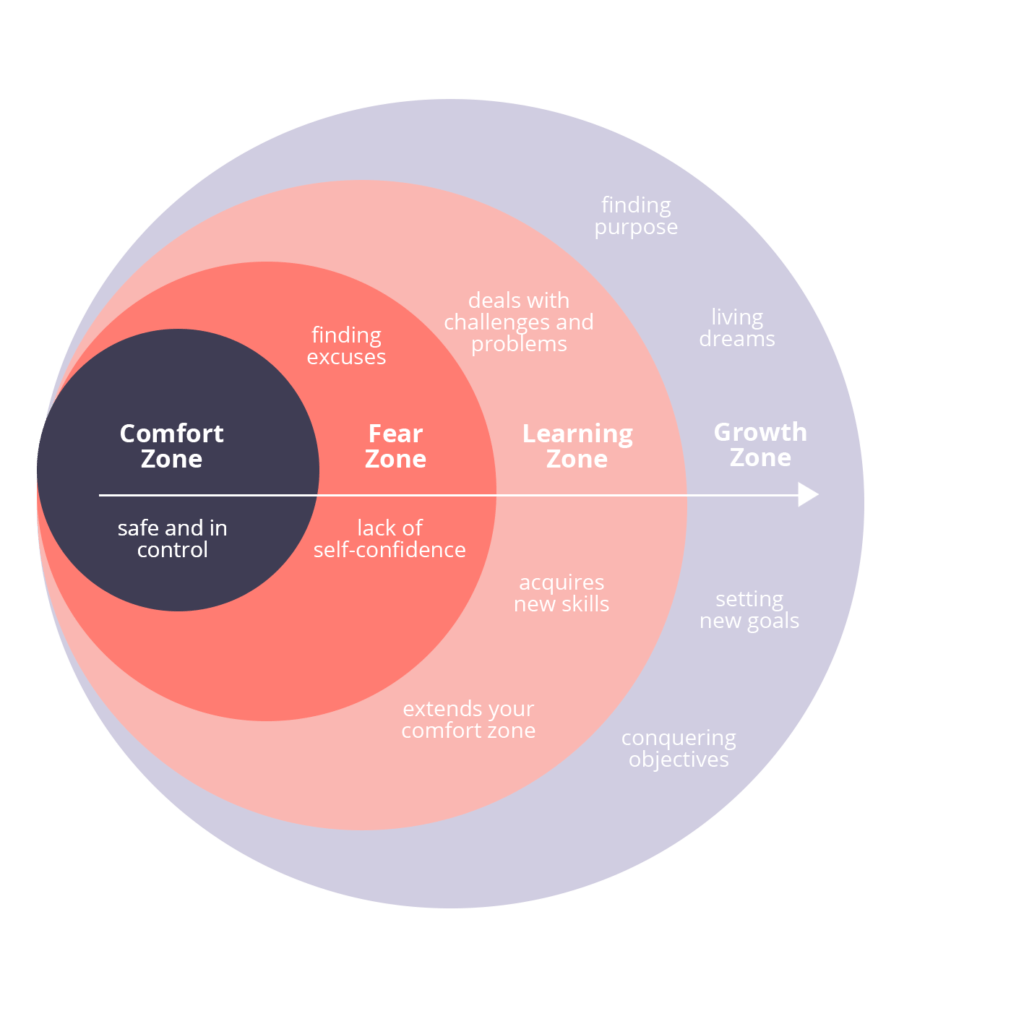“To be outstanding, get comfortable with being uncomfortable”
This is Part 6 of our 10-part series on the 10 Key Qualities and Habits of a Highly Effective Mentor. Read Part 5 here.
If you’re reading this, you probably are either curious if your mentor is giving you all they got, if you’re being a receptive mentee, or if you yourself are up to snuff in the mentoring department.
In this part of our series, we’ll look at how important it is for both mentors and their mentees to push themselves out of their respective comfort zones and into the growth zone. Let’s jump in!
Quality #6 of Effective Mentors: They Get Uncomfortable

1. They’re in the growth zone
Possessing the key quality of stepping outside their comfort zone is essential to being both a good mentor and a good mentee.
These people are willing to try new things, consider new thoughts, and think outside of the proverbial box for the sake of personal and professional growth. The comfort zone is a space where you will get uncomfortable.
Prospective mentors and mentees who are willing to try something new and give it a “go” will have the best chance of reaping the most benefits from their mentoring relationships.
So how do you get out of the comfort zone and make your way into the growth zone?
The comfort zone is where most people love to reside: It’s where you’re comfortable, don’t have to take risks or do anything new or different. It’s a safe space that you know; a space that doesn’t come with any unknown variables or unexpected surprises. This space is necessary in all of our lives: We absolutely should reside here during certain periods or under certain circumstances, but we have to know that the danger of this zone is that while we are living here, we aren’t going to grow. Life itself is full of unknowns, we can’t control it and have to accept that. That’s why it’s important to regularly push yourself out of your comfort zone in order to be better prepared when something goes awry.
Stepping outside of our comfort zones can be scary, but it’s important that we harness that fear as a propellant to push ourselves into new territory! From there, we can begin to take a chance to look around and learn about this new land we’ve encountered, and ultimately, grow from it. That’s because the more often we carry out this comfort→fear→learning→growth practice, the more comfortable we’ll be at being uncomfortable, the more chances we’ll take, the more often we’ll willingly enter this cycle, the more we’ll grow, faster, and so on!
2. They’re curious!
Inquisitiveness is a gem. The curious ones often will take the time to dive into new ways of doing things.
Being a curious mentor also means you should continue learning about what’s going on in your industry or business, your school, your community, or the world at large. Remember: What worked a decade ago may not be optimal today, and what works today may not work as well in one, two, five, or more years from now.
So, continual learning is essential if you plan to continue to be an effective mentor. Always keep an alert eye on trends, topics, and developments that may impact you or your role, both now and in the future. And if your mentee asks you something you don’t know the answer to, admit that you yourself do not know, then do yourself and your mentee a favour and follow up to find the answer.
People who are naturally curious tend to follow the “if there’s a will, there’s a way” philosophy. If they don’t know the answer or if they need help with something, they won’t sit back and wait; they’ll go looking for the answers.
Those who are curious will also generally participate more.
They’ll seek out resources to share, read, and further their learning via podcasts or tutorials. They do what they can to ensure they’re building a successful mentoring relationship, and this is incredibly valuable if you have a mentor.
Embrace the Fear of Being a Mentor and Get Uncomfortable
It can be nerve-wracking to put yourself out there as a mentor, as it can be difficult to know how much to impart and when to step back. As with anything, the fear of the unknown is a powerful factor, so take the time to get to know your mentee, their situation and their goals. This will help you feel more at ease and provide a better platform for mentorship.
The key is to embrace the fear. Oftentimes, it’s in these difficult moments that we learn the most. When we confront our discomfort, it allows us to grow and become better mentors. This growth process can be both mentally and physically challenging, but it’s worth the effort.
It’s important to remember that mentorship is a two-way street. As a mentor, you should be open to learning from your mentee as well. Ask questions, listen to their stories, and be open to their ideas. This will help you build a strong relationship and create a more meaningful mentorship experience.
Navigating Difficult Conversations as a Mentor
Difficult conversations are a part of mentoring, so it’s important to be prepared for them. As much as possible, try to approach conversations from a place of understanding and empathy. Take the time to listen to your mentee’s perspective and show that you care about their experience. This will help build trust between you.
A secret of journalists, researchers and interviewers everywhere: use open-ended questions to give your mentee space to express themselves fully. Involved questions such as “What do you think is the best way to approach this situation?” or “How do you feel about this?” will help you gain insight into their thinking process without putting them on the spot.
It is also important to be mindful of your body language and tone of voice when having difficult conversations. Maintaining a calm and respectful demeanour will help your mentee feel more comfortable and open to discussing the issue. Additionally, be sure to provide your mentee with resources and support to help them work through the issue.
Knowing When to Step Back as a Mentor
As a mentor, it’s important to recognize when it’s time to step back and allow your mentee to take the lead. Over-mentoring can be overwhelming and stifle growth, so make sure to give them enough space to make their own decisions and mistakes. This doesn’t mean that you should be completely hands-off; rather, it’s about striking the right balance between guidance and autonomy.
Encourage your mentee to express their own opinions and ideas so that they can truly take ownership of their growth. This will help them develop skills that will be beneficial for the rest of their lives.
It’s also important to provide feedback and constructive criticism in a way that is supportive and encouraging. This will help your mentee to understand how to use their mistakes as learning opportunities and grow from them.
Encouraging Growth in Your Mentees
One of the best ways to encourage growth in your mentees is to foster an environment that encourages learning and experimentation. Create assignments that challenge your mentees to think outside the box, or suggest activities that will help them gain new skills and knowledge.
When mistakes happen, use them as opportunities for learning rather than criticism. Praise effort rather than results and give feedback in a constructive way. Making these changes will help create an environment that allows your mentees to feel comfortable taking risks and growing.
Encourage your mentees to take ownership of their learning and development. Ask them to set goals and objectives for themselves and provide them with the resources and support they need to achieve them. This will help them to become more independent and self-motivated, and will also help them to develop a sense of pride in their accomplishments.
Recognizing Your Own Growth as a Mentor
Becoming a mentor is not only about helping your mentees grow—it’s also about recognizing your own growth as well. As you mentor others, reflect on what you have learned and how you have grown as a result. Having this awareness will help you become better at mentorship and develop your own unique style.
Take time to reflect on your experiences and think about how you can use them to become a better mentor. Consider the successes and failures you have had and how you can use them to improve your mentorship skills. Ask yourself questions such as: What have I learned from this experience? How can I use this knowledge to help my mentees? What can I do differently next time?
From Comfort Zone to Growth Zone
Mentorship is about pushing yourself out of your comfort zone in order to grow. You’ll get uncomfortable at times, but it’s worth it in the end. Recognizing your fears, navigating difficult conversations, knowing when to step back, and encouraging growth in your mentees are all important aspects of successful mentoring.
Mentorship is a two-way street. As a mentor, you should be open to learning from your mentee as well. Ask questions, listen to their ideas, and be willing to adjust your approach if needed. It’s also important to provide feedback in a constructive way, so that your mentee can learn and grow from it. Finally, be sure to celebrate successes and recognize progress, as this will help to motivate your mentee and keep them engaged.
Are you ready to push your team members into the growth zone by introducing a mentoring program at your organisation? Mentorloop can help! Start by sharing this series with your HR team, today!
Start Building Your Mentoring Program




